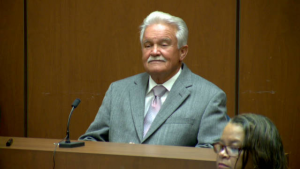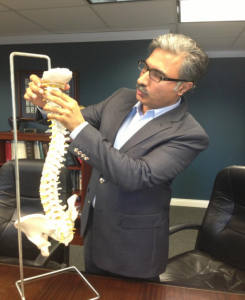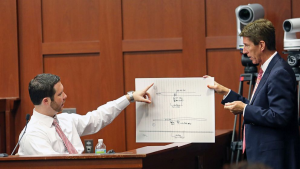MONTHLY PI ARTICLE AUGUST 2019
10 ETIQUETTE TIPS FOR TESTIFYING IN COURT
By Matthew J. DeGaetano, DC and Dr. Raymond Tolmos, DC, DABCI
Certified in Personal Injury
Anytime someone is called to the witness stand in a courtroom to testify, he or she is under scrutiny. The judge, providers, jury, and attendees closely examine what you say and how you say it. Understanding the appropriate etiquette in the courtroom can alleviate nerves and give you the confidence needed to speak clearly and openly.
Whether you are anticipating your first or fifth role as an expert witness, here are some etiquette tips to prepare you for the experience:

1. Dress appropriately. Come to court clean, well-groomed, and conservatively dressed. Stick with formal job interview clothing to the best of your ability. Wear dress pants, collared shirts, conservative blouses, and dresses/skirts that fall at a professional length
2. Act seriously and respectfully. Court is not the forum for speaking out of turn, laughing uncontrollably, or using slang terms or complex jargon. Wait patiently until you are called to the stand before you say anything about the case. Do not cheat.
3. Take a deep breath and tell the truth. You are on the stand to relate facts—not your opinion or an exaggeration. Listen to each question carefully and respond clearly and fully. If you need clarification, ask for it. You can respond by saying “I do not know” or “I do not remember.” Try not to ramble. If you need to take a moment to collect yourself, ask for it
4. Do not talk over someone in the courtroom. If the judge or an attorney starts talking during your testimony, stop talking for a moment. If you felt that what you had to say was important, ask to resume your statement after the person finishe
5. Answer questions. Avoid volunteering information unless an attorney asks for it directly. Answer each question honestly and completely, and avoid saying anything else. You do not need to talk for five minutes after each question. If a simple yes or no would suffice, then that is all you need to say
6. Remain calm. You cannot help anyone if you lose your temper on the stand. In fact, it could get you into trouble with the court and harm the credibility of your testimony. Show respect for everyone in the courtroom, even if you have strong feelings about the case
7. Modify your statement, if needed. We all misspeak on occasion. If you believe that your statement did not accurately reflect what happened, correct it as soon as possible. Ask if you can correct something that you said, and give a reason for the mistake. Getting flustered on the stand is perfectly normal
8. Avoid talking in absolutes. Unless you clearly remember something in detail and could not be mistake, avoid saying things such as, “That is everything that happened.” Human memory can be tricky. Use phrases such as, “That is what I remember from my records right now.”
9. Prepare to answer all questions truthfully. You may have to answer a question about who you have spoken with about a case. Many witnesses have a gut reaction to answer, “No,” because they think that maybe they were not supposed to say anything. If you spoke with the attorney about the case, or the patient, or anyone else, say so. Speak on the clinical facts while you are on the stand, and do not worry about anything else.
10. Remember that etiquette extends beyond the testimony. After you are excused, avoid saying anything about your time on the stand. Once a case is resolved, you can talk about what happened.
VIEW FROM THE WITNESS BOX: TESTIFYING IN COURT
A physician called to be an expert medical witness can take a number of steps to prepare for a successful court appearance.
Chiropractic / Medical expert testimony is often required to prove the injuries are the result of the crash itself.
Practicing physicians / chiropractors should expect to be called on to testify about their treatment of a patient at some point during the course of their practice. Some specialists, such as orthopedic surgeons, will be frequently required to testify about injuries they treated and observed in personal injury and workers compensation cases.
Understanding the role a treating doctor plays in the context of civil litigation will ease the anxiety associated with being asked to testify under oath. Essentially, a physician called to testify about his care and treatment of a plaintiff is a sophisticated fact witness and his role in the case is not dissimilar to that of a witness to an accident. The following discussion provides a basic synopsis of the role a treating doctor plays in civil litigation.
Definition of Fact Witness
A non-party physician may be called upon to testify as a fact witness and/or an expert witness. Although all physicians are “expert witnesses” because of their credentials, a legal distinction is made between physicians who testify based solely on facts gained from their actual treatment of a patient (fact witnesses), and physicians who give opinions based upon facts and/or materials furnished to them during the course of litigation (expert witnesses). When a treating physician testifies about both his treatment of the plaintiff and relies on additional information concerning matters beyond his treatment, he is essentially converted into an expert witness. A treating physician who is called upon to testify about his care of the plaintiff has virtually no way of avoiding giving testimony, while a physician asked to review materials and serve as an independent expert witness may simply decline the request. If a physician is called to testify about his evaluation and treatment of a patient or what procedures he performed, he is likely a fact witness.
A treating physician is generally considered to have no legal duty to give medical opinions that are not based on his personal observations and treatment of the plaintiff.
A physician wishing to limit his role to serving as a fact witness should testify strictly about his care of the plaintiff and should not review materials other than is contained in his own medical chart for the plaintiff. If a physician reviews depositions, records from other providers not already in the chart or other materials and renders opinions, he will likely become an expert witness and his role in the case will be more substantial.
Depositions and Fact Witnesses

Thus, a physician may elect to provide his testimony in a deposition at a time and location convenient to him in lieu of appearing in person at trial. One potential exception to this rule is that a judge may order the physician to appear live at trial, but this rarely occurs.
Additionally, this statute does not generally apply in federal court, where the physician can be compelled to attend the trial and testify in person. Whether the physician’s testimony is given by deposition or in court, the testimony is under oath. The physician may also be required to produce and release medical records at the deposition. These records can include office notes, laboratory values, x-rays and ECGs. The time and place of the deposition is normally fixed by agreement and usually taken at the physician’s office. Because of conditions in a particular case, the attorney may find it necessary to subpoena the physician as a witness. Production of medical records may also be required by subpoena served on the physician. The subpoena requires the physician served to attend the deposition at the time and place stated in the subpoena and produce the specified records. If the time and place described for the deposition creates a hardship, the physician should immediately notify the parties.
A potential source of conflict between physicians and attorneys is compensation for the physician’s time spent providing testimony. While these instances may be rare, they occur often enough to arouse concern. In order to attempt to avoid this problem, the physician’s charges and the responsibility for payment should be discussed and agreed to by the physician and the attorney before the deposition.
Generally, fact witnesses cannot charge expert witness fees and may receive only the statutory witness fees for testifying, which vary but are lower than expert fees. However, most attorneys will exercise professional courtesy and pay a treating physician witness a reasonable fee for his time.
In this instance, compensation rests principally on contract or is determined by custom and past practice. It is advisable that physicians establish a standard rate for providing deposition testimony and base the rate on what they would earn if they were treating patients instead of giving a deposition. Regardless, if there is any question as to the charge, it should be discussed and worked out before the deposition.
Keep detailed, accurate medical records. Many cases take a year or more to reach the courtroom and you may have little independent recollection of the case after that length of time. This makes your medical records critical. Ensure that all records are complete, clear, and legible, with all dates and times listed. Document all statements verbatim. Describe all injuries in detail.
Prepare to testify. Some problems can be avoided with adequate preparation.
- Attend an interview with the lawyer who has called you to testify. This is essential. The lawyer can then tell you which questions he or she will be asking and advise you regarding the need for additional materials.
- Be careful what you take into the courtroom, as lawyers may ask to see anything that you bring.
- Have an up-to-date CV and know what is in it.
- If asked to do so, bring relevant articles to court. Know the field so that your testimony can reflect generally accepted medical / scientific / research facts.
- Review the case in detail before going to court and also review any previous testimony that you have given on the matter.
- Prepare visual aids if possible. People remember 80% of what they see and only 15% of what they hear. Visual presentations have much more impact.
- Dress appropriately.
Your testimony
When you are called to take the stand, you will usually need to be approved as an expert witness. You should be prepared to answer any questions about your CV. It is important to be organized and to show that you have qualifications and experience in the specific area of interest. Mention all recent conferences you have attended and any previous court appearances you have made. Either side in the case may question you about your qualifications.
After your qualifications are discussed, the lawyer who called you will introduce the medical evidence or refer to medical evidence already presented. You may then be cross-examined about your testimony. Often this part of the case is stressful. Remember you are not there to take sides but to objectively present the medical evidence. In a court case, many different types of evidence are collected. You are there to address only the medical aspects of the case.
The role of the expert witness is one of considerable responsibility. You should see the court experience as an opportunity to educate the judge and/or jury. Your portrayal of the medical facts should be thorough and impartial.
Keep the following in mind while testifying:
- Stay in your area of expertise. Remember you are there to help the court understand complex issues.
- Keep your testimony balanced and accurate. You should give both points of view on a matter if they exist.
- Any statement you make in court should be of the same quality and reflect the same scholarship it would if you were making the statement at a scientific seminar or publishing it in a reputable journal.
- If you don’t know the answer to a question, don’t guess. Consider your answers carefully. Think before you speak.
- If you don’t understand the question, say so.
- Provide answers only to the questions you are asked.
- Use language and terms that will be understood by the judge and/or jury.
- Speak up, speak clearly, speak simply.
- Be polite and serious. Do not be argumentative.
- Never say never or always.
- Always tell the truth.
Whether you are testifying at the request of the defense or the prosecution, your testimony should be the same.
Irresponsible testimony by medical experts is a growing problem. Types of irresponsible testimony include the “expert” witness who lacks proper qualifications, the use of unique or very unusual interpretations of medical findings, [3] the flagrant misquoting of medical journals, the making of false statements, and the deliberate omission of pertinent facts. You may be asked to refute testimony by such an irresponsible expert.
As a physician providing medical evidence, you are not in court to win the case; that is up to the lawyers. Your role is to present scientific theory and knowledge clearly and in an impartial manner. [4]
Conclusion
A treating physician called upon to testify about his treatment of a plaintiff should consider the role he wants to play in the case before agreeing to review any materials other than his own chart. Additionally, if the physician wishes to charge for his time, he should work this out with counsel prior to the deposition. Finally, all treating physicians should be aware they are statutorily exempt from subpoena to testify at trial and can require the parties to conduct their deposition instead of appearing at trial.
References:
Olsson I, Bunketorp O, Carlsson G, et al.: An in-depth study of neck injuries in rear end collisions. 1990 International IRCOBI Conference, Bron, Lyon, France, September 12-14, 1-15, 1990.
Ryan GA, Taylor GW, Moore VM, Dolinis J: Neck strain in car occupants: injury status after 6 months and crash-related factors. Injury 25(8):533-537, 1994.
Pennie B, Agambar L: Patterns of injury and recovery in whiplash. Injury Brit J Accid Surg 22(1):57-59, 1991.
Evans RW: Some observations on whiplash injuries. Neurologic Clinics 10(4):975-997, 1992.
Radanov BP, Sturzenegger M, Stefano GD: Long-term outcome after whiplash injury: a two-year follow-up considering features of injury mechanism and somatic, radiologic, and psychosocial factors.
Medicine 74(5):281-297, 1995.
Croft AC, Herring P, Freeman MD, Haneline MT: The neck injury criterion: future considerations Accid Anal Prev 34;247-255, 2002.
Freeman MD, Croft AC, Rossignol AM, Weaver DS, Reiser M: A review and methodologic critique of the literature refuting whiplash syndrome. Spine 24(1):86-96, 1999.
Croft AC: Unpublished human subject crash test data from the Spine Research Institute of San Diego.
Baer N: Fraud worries insurance companies, but should concern physicians too, industry says. Can Med Assoc J 156(2):251-256, 1997.
Croft AC, Freeman MD: Auto insurers and their new role in whiplash prevention─new rules, new risks, new tests. Forum 35(3):9-13, 2005.







